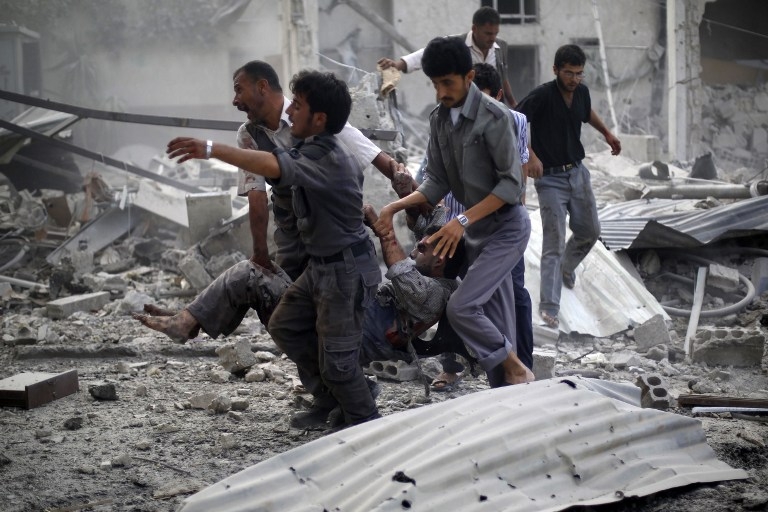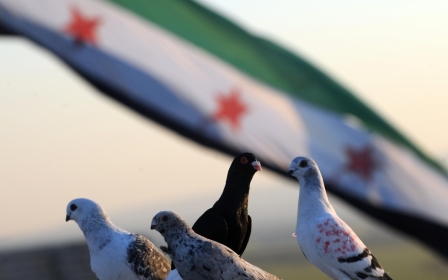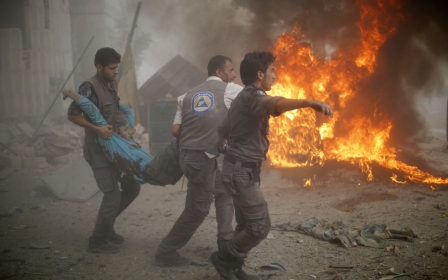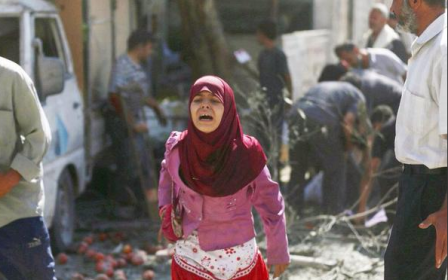UN security council pushes for peace talks in Syria following Douma massacre

The UN Security Council has backed a push for Syrian peace talks in a rare show of unity after widespread condemnation of government air strikes that killed nearly 100 people.
Analysts said the vote showed new resolve to address Syria's conflict, but cautioned it was only a first step and that serious differences between the two sides remained.
The Security Council statement, the first of its kind in two years, urges a political transition and backs a plan to create working groups to discuss ending the war.
It was approved hours after UN officials, including peace envoy for Syria Staffan de Mistura, expressed horror at air strikes that killed nearly 100 people in a rebel-held town near Damascus.
On Tuesday, Syria's government hit back at de Mistura's criticism, accusing him of "making statements that lack objectivity".
The 16-point council statement backed an approach outlined by de Mistura last month after talks with parties to the four-year conflict.
It proposes four working groups with members from the government and opposition to discuss safety and protection, counterterrorism, political and legal issues and reconstruction.
The council urged "a Syrian-led political process leading to a political transition that meets the legitimate aspirations of the Syrian people".
It called for "an inclusive transitional governing body with full executive powers" to be formed with "mutual consent while ensuring continuity of governmental institutions".
It made no mention of President Bashar al-Assad, whose future has long been a sticking point in peace talks.
Assad and his backers say he was legitimately elected and cannot be forced aside, but the opposition insists his departure must be part of any peace deal.
A 'first step'
The vote follows a flurry of diplomatic activity led by government backer Moscow, which in recent weeks hosted Syrian opposition figures and officials from Saudi Arabia, a key opposition supporter.
The council's vote reflects "an unanimity that is unprecedented for several years," said analyst Karim Emile Bitar, a senior fellow at the IRIS think tank in Paris.
"I think it reflects a common awareness of the general state of fatigue in both parties, the fatigue and even exhaustion of both sides," he said.
But Bitar said the plan was only a "first step".
"At this stage, neither side is willing to make additional concessions that could allow this rapprochement to have concrete effects on the ground."
Andrey Baklitskiy, an expert at Moscow's PIR-Centre think tank, said there was "nothing revolutionary" in the Security Council statement, and it did not contradict previous Russian statements on the issue.
"The text is fairly evasive, it is not clear on the implementation," he added.
The opposition National Coalition also responded cautiously.
"The problem is that the plan puts equal importance on the transition process and the other points, while for us the transition is the priority," said Coalition member Samir Nashar.
Bassam Abu Abdullah, an analyst in Damascus who is close to the regime, also said de Mistura's focus was misguided.
"The most important thing is the war on terror - without that we can't talk about anything else," he told AFP.
Damascus slams UN envoy
Haytham Manna, an opposition figure from outside the National Coalition, said efforts were already under way to find members for the four committees.
"The committees will work at their own pace and the Security Council will get involved if there are blockages and vote on resolutions when there are advances in different areas," he said.
The Security Council vote came after government air strikes on a rebel-held town outside Damascus killed nearly 100 people on Sunday, prompting widespread criticism.
The strikes on Douma, which killed at least 96 people, many of them in a marketplace, were among the deadliest government attacks in the conflict.
De Mistura, speaking Monday, described the strikes as "devastating".
"Hitting crowded civilian markets killing almost 100 of its own citizens by a government is unacceptable in any circumstances," he said.
On Tuesday, Damascus hit back at the criticism, accusing de Mistura of failing to be neutral.
"In his recent comments Staffan de Mistura has strayed from neutrality," Syrian state media said, citing a foreign ministry source.
The source accused de Mistura of "making statements that lack objectivity and facts and rely on what is promoted in circles known for their hostility to Syria".
'No legitimacy'
The US state department on Monday condemned the Syrian government airstrikes on Douma and described Assad as having "no legitimacy".
"Yesterday’s air strikes, following its other recent market bombings and attacks on medical facilities, demonstrate the regime's disregard for human life," State Department spokesman John Kirby said in a statement on Monday.
"As we have said, Assad has no legitimacy to lead the Syrian people."
Since the beginning of violence in 2011, at least 240,000 have been killed as the conflict fragmenting into numerous warring factions.
At least four million Syrians have been forced to flee the country, and millions of others are internally displaced.
Middle East Eye propose une couverture et une analyse indépendantes et incomparables du Moyen-Orient, de l’Afrique du Nord et d’autres régions du monde. Pour en savoir plus sur la reprise de ce contenu et les frais qui s’appliquent, veuillez remplir ce formulaire [en anglais]. Pour en savoir plus sur MEE, cliquez ici [en anglais].




